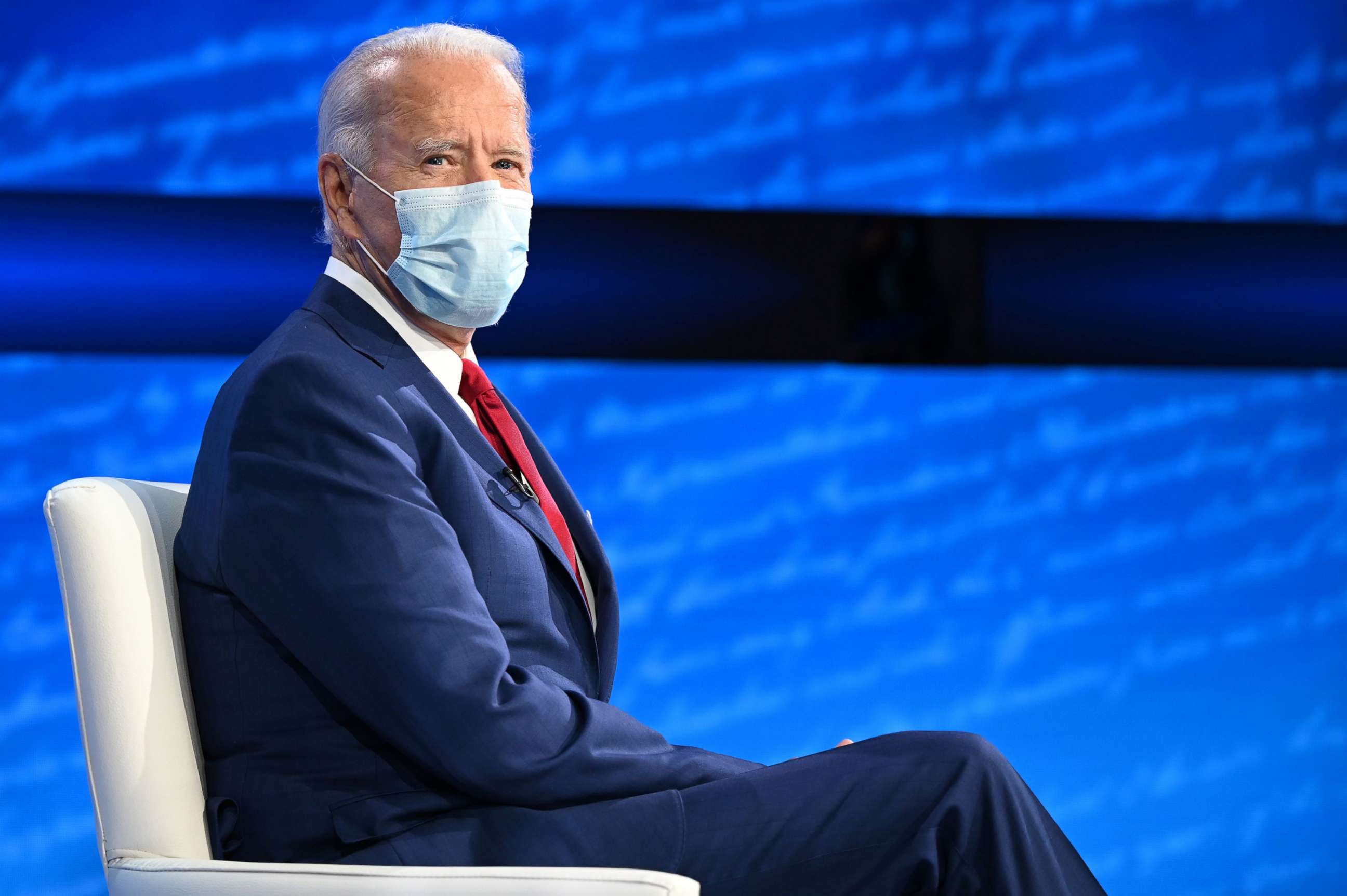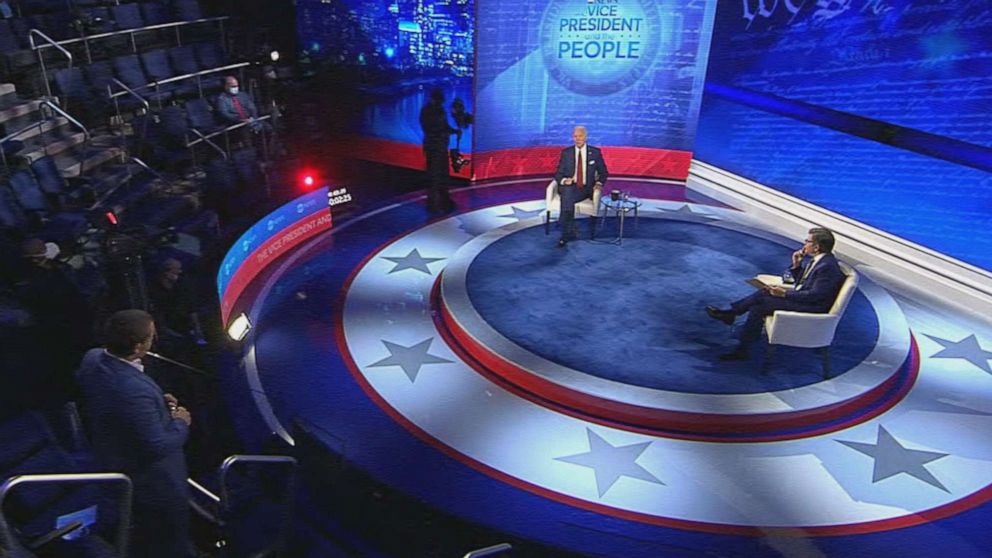What you need to know about Joe Biden
This is Biden's third run for president. Here's what you need to know about the Democratic presidential nominee.
Highlights from Biden's town hall with voters in Philadelphia.
With less than three weeks to Election Day, Democratic nominee for president Joe Biden faced voters directly in an ABC News Town Hall from the National Constitution Center in Philadelphia on Thursday night.
The live special edition of "20/20" -- titled "The Vice President and the People" -- was moderated by ABC News Chief Anchor George Stephanopoulos.
The primetime event followed a fiery back-and-forth on the fate of the second presidential debate, which was originally scheduled for Thursday in Miami but ultimately canceled last Friday.
The nonpartisan Commission on Presidential Debates changed its format to be virtual following President Donald Trump's positive COVID-19 diagnosis, to which Trump took issue, saying he wouldn't "waste" time in a virtual debate. With Trump's rejection of the event, Biden then agreed to participate in the town hall with ABC News.
Voters had the opportunity to ask the former vice president the questions most important to them
The event was held in accordance with state and local government health and safety regulations, as well as guidelines set forward by health officials.
Trump, at the same time Thursday, participated in a town hall from Miami with NBC News. The president participated in an ABC News town hall in September.
This is Biden's third run for president. Here's what you need to know about the Democratic presidential nominee.
Anthony, a Republican voter from Canonsburg, Pennsylvania, asked Biden about his assertion that he wouldn't raise taxes on anyone making less than $400,000 a year and how that fit with his promise to repeal the Trump tax cuts.
Biden said that the majority of those tax cuts, $1.3 trillion out of a total $2 trillion, went to the wealthiest Americans.
"If you raise the corporate tax just back to 28%, which is a fair tax, you'd raise $1,300,000,000 by that one act," he said. "If you made sure people making over $400,000 paid what they did in the Bush administration, 39.6%, you'd raise another -- it goes up to, let me get you the exact number here -- about another 200 -- excuse me, $92 billion."
Stephanopoulos asked Biden if the economy could handle the tax increases after the (devastation) caused by the pandemic. Biden pointed to a Moody's analysis of his tax plan which said his plan would create 18.6 million jobs and raise the GDP by a trillion dollars. He also talked about the wealth that billionaires gained, while millions of Americans were out of work.
Trump "talks about a V-shaped recovery. It's a K-shaped recovery," Biden said. "If you're on the top, you're going to do very well. ... If you're at the bottom, or you're in the middle or the bottom, your income is coming down. You're not getting a raise."
Stephanopoulos pressed Biden on whether it's wise to raise the corporate tax when the economy is weak.
"We're going to invest a great deal of that money into infrastructure and green infrastructure," he said.
Biden was asked by Republican Kelly Lee about his views and plans for a future coronavirus vaccine.
During last week's vice presidential debate, Sen. Kamala Harris said she would trust scientists over the president with regard to the validity of a vaccine.
Biden warned that Trump's rhetoric on vaccine and health guidelines have been questionable.
"President Trump says things like, you know, everything from this crazy stuff he's walking away from now, inject bleach in your arm and that's going to work," he said. "I'm not being facetious though. He actually said these things."
Biden said that he's been meeting with scientists and complimented them for their diligence in their research.
"They're not there yet," he said. "And the most scientists say -- it's not likely to have a vaccine that would be available until the beginning of next year, into the spring of next year."

Stephanopoulos asked if Biden would mandate a vaccine's use once it's safe and effective. Biden said it would depend on several factors.
"It depends on the state of the nature of the vaccine when it comes out and how it's being distributed," he said. "But I would think that we should be talking about, depending on the continuation of the spread of the virus, we should be thinking about making it mandatory."
The first question of the night came from Nicholas Freden, an attorney from Jenkintown, Pennsylvania, who asked how Biden would have responded to the COVID-19 pandemic when it began and what following the science looked like to Biden going forward.
The former vice president responded by what he called for beginning in February, including keeping pandemic investigators on the ground in China and utilizing the Defense Production Act earlier.
Trump "missed enormous opportunities and kept saying things that weren't true," Biden said. "It's going to go away by Easter. Don't worry about it. It's going to all -- when the heat -- when the summer comes, it's all going to go away like a miracle. He's still saying those things."
Stephanopoulos pressed Biden, asking why he didn't call for masks in January and February, early in the pandemic. The former vice president responded by saying he started wearing masks and social distancing in March when scientists, like Dr. Anthony Fauci, began to recommend it.
" What we should be doing now, there should be a national standard," Biden said. "Remember what the president said to the governors. Well, they're on their own, it's not my responsibility, the governors can do what they need to do, not my responsibility. It is a presidential responsibility to lead. And he didn't do that."
